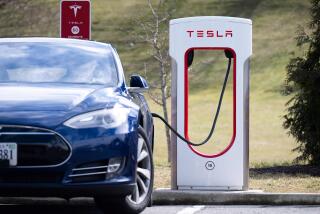Chrysler takes on rebate issue
- Share via
The common refrain is that if automakers simply cut prices, they’d sell more cars without having to offer rebates.
The evidence says otherwise.
Chrysler Group set out to reduce the size of profit-robbing incentives with a value-pricing strategy for 2004. It copied the Japanese by lowering the price but adding more equipment to attract buyers without having to pay them.
The vehicle designated to set the pattern was the ’04 Dodge Durango sport-utility, unveiled with $1,000 to $2,000 price cuts, depending on model, though standards such as anti-lock brakes, larger 17-inch wheels and a CD player were added.
“We wanted to be like the imports by adding more content and lowering the price,” and then if incentives were needed, “we could offer them at lower levels,” said Dieter Zetsche, president and chief executive of Chrysler Group.
Durango now carries a $4,500 rebate, among the largest in the industry. While value pricing suffered a setback with the Durango, Zetsche said the value-priced 2005 Chrysler minivans are doing well.
The ’05 minivans were priced at almost $3,000 less than the ’04 models, yet second- and third-row seats that fold flat into the floor were added as standard.
In the first quarter, minivan sales were off 12%, but when the ’05 models rolled out in April, sales rose 3% and continued strong in May, Chrysler said.
The vans carry $1,000 rebates, which Chrysler says are needed to draw attention in a crowded market. But considering that the company offered $3,500-$4,500 rebates to dispose of the 2004s, Chrysler is still, indeed, reducing incentives.
Reducing incentives is vital to profitability, the automakers insist. Chrysler incentives averaged $4,301 per vehicle in the first quarter. Even with the incentives, however, Chrysler earned $366 million in the first quarter of this year.
The flaw in such thinking is that even with value-pricing, consumers expect incentives.
“Value pricing works only if you lower the price a lot, and $2,000 isn’t enough because people expect at least $4,000 in rebates,” said Art Spinella, general manager of CNW Marketing/Research.
But Zetsche is optimistic, insisting that the key to long-term success is “product, product, product,” and Chrysler has more new machines coming.






